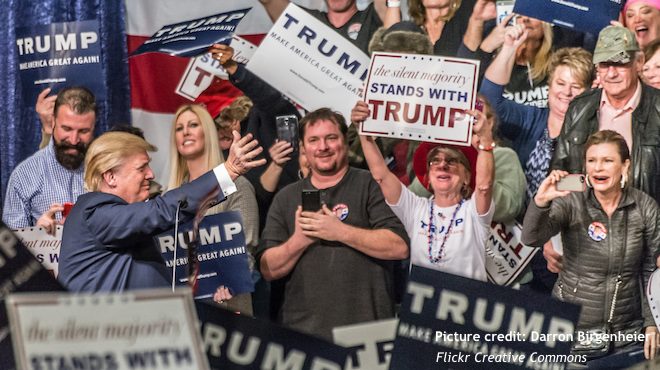The Trump-effect in South Korea

Nobody knew. Just like everyone else around the globe, the situation was exactly same in South Korea. Frustration, panic and anxiety were the initial reactions just after the US presidential elections, but, as time went on more delicate predictions began to emerge. The question is pretty simple: “What will the Trump administration’s new world order look like and how will it impact South Korea’s economy and security?”
Yet still, we don’t know. Many statements from the President-Elect during his campaign were wandering and even self-contradictory. His foreign-policy pledges appeared brittle, which makes it even more difficult for the Korean public and experts to create a clear picture of the future of the alliance. However, we do have some clues, many of which Koreans are desperately hedging their bets on. Although these are mostly speculation, it would appear that Korean tax-payers have been granted an unexpected chance to review their current foreign policy strategy.
“Disastrous deals…”
The most volatile area is business, especially the manufacturing industry. As a typical trade-oriented economy, recently the country has earned more than 50% of GDP from exports and 20% of GDP through manufacturing conglomerates like Samsung Electronics and Hyundai Motors. Signing onto aggressive global Free Trade Agreements has been part and parcel of South Korea’s strategy since the late 1990’s. But Trump has shown his warmth towards protectionism and even singled out the Korea-US free trade agreement as a ‘catastrophe’.
It seems normal then that South Korea’s business community has looked upon this situation with weary eyes. For them, the more frustrating part is not Trump himself, but the regionalist and protectionist policies that he espouses. Both this election and the Brexit cast a gloomy omen for the world order espoused by Free Trade. It was under these conditions that after the 1980’s South Korea had a platform to rapidly and successfully build its economy. If we can say that the country has been a prudent beneficiary of neo-liberalism, then now she is frightened to be a victim with its end.
“I’d like them to pay up…”
Alternatively, security issues are fairly more complicated. Trump’s comments regarding the Korean Peninsula have been so incoherent that it’s impossible to predict which of them (if any) would be realized as official foreign policy.
First, to the alliance. It’s quite certain that the Trump administration will at least try to cut its financial commitment to overseas US Forces in order to boost the US domestic economy. In doing so, he will ask Seoul to provide a greater financial contribution to the USFK (United States Forces Korea), downsize it, or withdraw it. Although South Korea contributes about 0.8 billion USD to the USFK ‘burden-sharing fund’ ever year (a little less than half of its entire stationing cost) Trump has at least teased, “why not 100%?” In response to this, the US DoD announced that stationing the same number of troops in the homeland would be far more expensive than the current formula. However, there is also speculation that a Trump administration has selected USFK as an example for other alliances (namely Japan and NATO) of the new financial arrangements it expects. In any case, negotiations regarding the funding of USFK are scheduled to be held in 2018.
Secondly, nuclear armament. After the 5th nuclear test, there has been considerable debate over whether South Korea should develop a military nuclear capacity of its own or even reintroduce US tactical nuclear weapons into the territory. Compared with his predecessor, Trump’s approach towards nuclear proliferation seems both erratic and naïve. In this vein, some South Korean politicians and experts who support Trump’s ideas consider his victory as a sort of opportunity, even though the Presidential transition team officially debunked this option and Trump himself denied his original comments.
Third, North Korea. As is usually the case, Trump has produced a series contradictory messages. Accordingly, speculations in Seoul have varied from end to end. Yes, he said that he would meet with Kim Jong-un over hamburgers, but the comment was more a critique of ‘expensive diplomatic state dinners that waste taxpayers’ money’, than a lesson in multi-track diplomacy. Yes, he also mentioned that he would ‘disappear’ Kim, but that comment was made whilst criticizing China’s negligence towards North Korea’s nuclear program, and the intent was not about ‘disappearing Kim’ but ‘pressing China’. All in all, it would be rational to assume that there has been no chance for the President-Elect to think about South Korea seriously, or at all.
“America first…”
In sum, there is no doubt that the Trump administration’s “American First” agenda translates to a 21st century version of isolationism or selective engagement and forewarns a huge change of geopolitics in East Asia. Accordingly, Obama’s already weak “Pivot to Asia” will be further diluted and tenuous security arrangements like the deployment of THAAD become even more complicated. More crucially, a change like this is highly likely to leave a kind of a power vacuum. Countries in the region have only but two options: self-reliance, or reinforce their economic and security relations with China. This is the main reason why many Korean media outlets and experts are reasoning that this is the perfect moment to reconsider the country’s current posture. Agendas such as developing robust domestic consumer demand and clawing back wartime operational control over the Korean military from the US were previously dismissed as too progressive. Given the new momentum from the White House these options seem now to be quite plausible. Well, just like an old saying in Korea: Crisis is opportunity.
Dr. Ildo Hwang is Research Fellow with The Institute 21 For Peace Studies, The Dong-A Ilbo Media Group in South Korea. He has worked as Staff Reporter with The Dong-A Ilbo for 16 years, and his major coverage as a journalist was North Korean issues, the United States Forces in Korea, and security policy making process of the Blue House, Korean military and intelligence agencies.